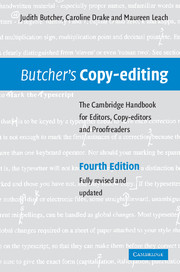Book contents
- Frontmatter
- Contents
- List of illustrations
- Preface to the fourth edition
- Preface to the third edition
- Preface to the second edition
- Preface to the first edition
- Acknowledgements
- 1 Introduction
- 2 Preliminary copy-editing, design and specimen pages
- 3 Preparing the text for the typesetter
- 4 Illustrations
- 5 Proofs
- 6 House style
- 7 Preliminary pages
- 8 Indexes
- 9 Other parts of a book
- 10 Bibliographical references
- 11 Literary material
- 12 Multi-author and multi-volume works
- 13 Science and mathematics books
- 14 Other special subjects
- 15 Reprints and new editions
- 16 On-screen editing
- Appendixes
- Glossary
- Select bibliography and other resources
- Index
12 - Multi-author and multi-volume works
Published online by Cambridge University Press: 05 August 2012
- Frontmatter
- Contents
- List of illustrations
- Preface to the fourth edition
- Preface to the third edition
- Preface to the second edition
- Preface to the first edition
- Acknowledgements
- 1 Introduction
- 2 Preliminary copy-editing, design and specimen pages
- 3 Preparing the text for the typesetter
- 4 Illustrations
- 5 Proofs
- 6 House style
- 7 Preliminary pages
- 8 Indexes
- 9 Other parts of a book
- 10 Bibliographical references
- 11 Literary material
- 12 Multi-author and multi-volume works
- 13 Science and mathematics books
- 14 Other special subjects
- 15 Reprints and new editions
- 16 On-screen editing
- Appendixes
- Glossary
- Select bibliography and other resources
- Index
Summary
BOOKS WITH MORE THAN ONE AUTHOR
This section is primarily concerned with contributory works such as conference proceedings, companions and reference books, where each paper or chapter is written by a different person, but of course the same kinds of problem are found in books written jointly by two or three authors: the text is likely to be more inconsistent, and you need to know whom to consult about queries and whether any contributors should receive copies of the queries.
In what follows, ‘volume editor’ is used to mean the editor of the particular book, as against the commissioning editor.
What volume editors can be asked to do
All the contributions should pass through the volume editor's hands before they reach the publisher; but the extent of the work that volume editors do depends very much on what has been agreed with the commissioning editor. Conference proceedings and other very topical works may need to be processed quickly, whereas a commissioned volume such as a companion or a monograph will need as much time spent on it as any other book.
The commissioning editor and volume editor should draw up some instructions for contributors as early as possible. The commissioning editor can explain why certain faults in texts can delay a book, and emphasize that, if the volume editor and contributors are careful about these points, the publisher and typesetter will be able to deal with the book more quickly.
- Type
- Chapter
- Information
- Butcher's Copy-editingThe Cambridge Handbook for Editors, Copy-editors and Proofreaders, pp. 294 - 306Publisher: Cambridge University PressPrint publication year: 2006



